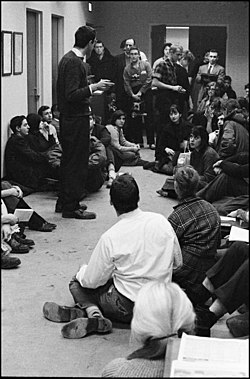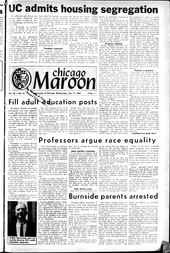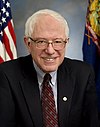University of Chicago sit-ins
| University of Chicago sit-ins | |||
|---|---|---|---|
| Part of the Civil Rights Movement | |||
 Bernie Sanders speaks to protesters on January 23, 1962, the first day of the sit-ins | |||
| Date | January 23 – February 5, 1962 | ||
| Location | Chicago, Illinois | ||
| Caused by | Racial segregation in off-campus housing | ||
| Parties | |||
| |||
| Lead figures | |||
Member of CORE
President of UChicago
| |||
- v
- t
- e
United States
- University of Chicago sit-ins
- Chicago Public Schools boycott
- Chicago Freedom Movement
State of Indiana
- Indiana Fair Employment Practice Act
State of Kansas
- Brown v. Board of Education
- Dockum Drug Store sit-in
- Kansas Fair Employment Practices Act
State of Michigan
- Detroit Walk to Freedom
- Michigan Fair Housing Act
State of Missouri
- Shelley v. Kraemer
- Missouri Public Accommodation Act
State of Ohio
- Ohio Civil Rights Act
- Cleveland Convention Center labor dispute
- Death of Bruce W. Klunder
The University of Chicago sit-ins were a series of nonviolent protests at the University of Chicago in Chicago, Illinois in 1962. The protests were called to end alleged segregation in off-campus university-owned residential properties.
Events
Dialogue

According to Chicago Maroon managing editor Avima Ruder, a staffer at the student paper, found a copy of the University budget, and "we discovered that the University owned a lot of segregated apartment buildings...It was really bizarre because our student population at that point was largely white, but there was no segregation, there weren't separate dorms for African American students—if someone had suggested that, people would have been appalled."[1]
At first, the editors decided not to publish the news. Instead, they shared the apartment addresses with the Student Government, which reached out to the university chapter of the Congress of Racial Equality (CORE) to "conduct six test cases in which African American students attempted and failed to secure apartments in the segregated buildings."[1] Student Government and CORE confronted President George Beadle with their findings and demanded the buildings be desegregated. On January 17, 1962, the Maroon broke the story on the paper's front page with the headline, "UC Admits Housing Segregation."[1] Beadle wrote a letter to the paper, agreeing that the university segregation was a problem, emphasizing the University's nondiscrimination policy and the difference between on-campus housing, which was open to all, and commercial residential properties acquired by the University, many of which had existing segregation policies. "The only issue on which there is arguable difference of opinion," Beadle wrote, "is the rate at which it is possible to move toward the agreed objective without losing more than is gained."[1]
Protests

Frustrated with Beadle's call for "planned, stable integration," CORE activists, including Bernie Sanders, led a rally at the University of Chicago administration building to protest university president George Beadle's segregated campus housing policy. "We feel it is an intolerable situation when Negro and white students of the university cannot live together in university-owned apartments," Sanders announced at the protest. Sanders and thirty-two other student activists marched into the building and camped outside the president's office.
From January 23 to February 5,[2] Sanders and the other civil rights protesters pressured Beadle and the university to form a commission to investigate discrimination.[3] Beadle met with 300 students in the Ida Noyes Hall theater to announce that further sit-ins would be banned and that a committee would be formed to investigate CORE's charges of racial discrimination in University-owned buildings.[4]
See also
References
- ^ a b c d Muhlenkamp, Katherine (2012). "Aristotle Schwartz leaves. Malcolm X debates. The Chicago Seven feast. Maroon reporters were there". The Core; College Magazine of the University of Chicago. Retrieved 2015-09-10.
- ^ The Gold and the Blue: A Personal Memoir of the University of California, 1949 - 1967. 2001.
- ^ Craven, Jasper (2015-08-26). "Can Sanders' civil rights experience at U. of C. translate on campaign trail?". Chicago Tribune. Retrieved 2015-09-10.
- ^ "The University of Chicago Centennial Catalog". Retrieved 2015-09-10.













